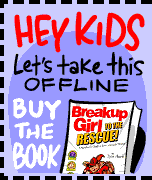<
PREVIOUS ||
NEXT >
 2. Checklists: What are the signs of healthy/unhealthy relationships?
2. Checklists: What are the signs of healthy/unhealthy relationships?
How do I know if I am in a healthy relationship?
You are probably in a healthy relationship if you answer YES to the following
question:
Does s/he think you are the bomb?
And act accordingly -- in the ways discussed above that honor you and the
relationship?
How do I know if I am in an unhealthy, abusive, or even violent relationship?
You may be in an unhealthy or dangerous relationship if you answer YES to even
just one of the following questions:
- Does s/he ever insult you, to the point where it's "not funny anymore?"
("You're annoying," "You suck at math," etc.)
- Does s/he tell you not to hang around with your friends because s/he finds
fault with them or resents the time you spend with them?
- Do your friends not like this person?
- Does s/he make you afraid to disagree or to make him/her angry?
- Do you feel like you're restricting yourself? Not seeing friends or going
places (maybe even school) because you are afraid to make your partner mad?
- Does it feel like this person has a "dark side?"
- Does s/he say things that are half romantic, half creepy, such as, "I
can't breathe without you?"
- Does s/he get jealous over...nothing? (e.g. seeing friends, talking to opposite-sex
friends)
- Does s/he make you report your whereabouts 24/7?
- Does s/he ever touch you sexually when you say you don't feel like it? Force
you when you say no?
- Does s/he ever threaten to hurt you?
- Does s/he ever threaten to hurt him/herself "because of" you?
Especially if you say you might leave?
- Does s/he ever punch the wall, throw things in anger, drive dangerously
when you're in the car?
- Does s/he ever actually restrain, push, slap, scratch, kick, or hit you?
- Does s/he apologize profusely -- flowers, tears, the works -- and then get
mean and bad all over again?
- Does anyone else quoted in this column sound just like you?
If you answered YES, please: talk to someone. If you're a teen or student,
tell a parent, relative, guardian, clergy person, teacher, or other adult who
knows you well. Friends are crucial for emotional support, but you might need
someone to help you find legal, medical, or community sources of help. If one
doesn't seem to take you seriously, find another. Keep talking until someone
listens.
You can also always call a national
or local hotline. They will not think you are a freak or a loser. They will
not lecture you or tell you what to do. They are there to listen and help you
do what you think is best.
NEXT:
Now what?









 2. Checklists: What are the signs of healthy/unhealthy relationships?
2. Checklists: What are the signs of healthy/unhealthy relationships?